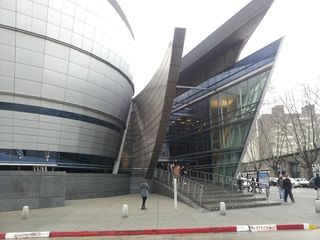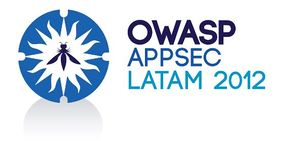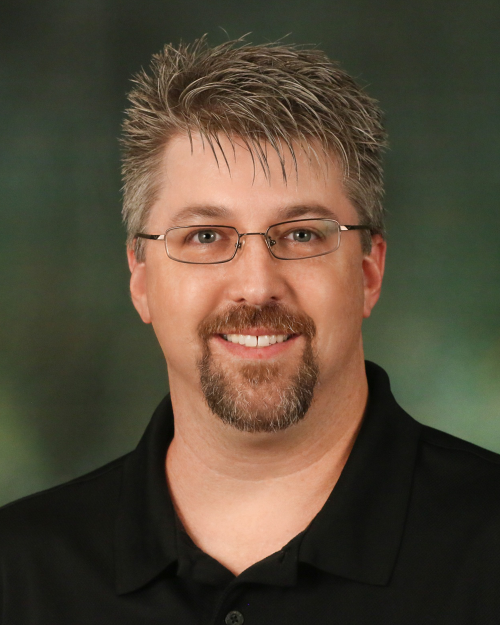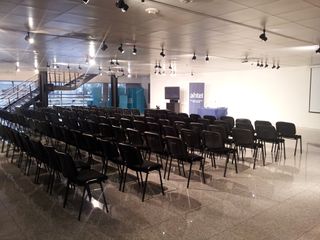This site is the archived OWASP Foundation Wiki and is no longer accepting Account Requests.
To view the new OWASP Foundation website, please visit https://owasp.org
AppSecLatam2012/es
| |
|
|---|---|

|
- Bienvenidos
- Entrenamientos
- Charlas destacadas
- Presentaciones
- Lugar
- Registro y Costos
- Patrocinadores
- Informacion util
- Eventos sociales
- Chapter Leader Workshop
- Organizacion
|
|
Los entrenamietos se harán el 18 y 19 de noviembre de 2012 (Domingo y Lunes, respectivamente) en el edificio de la Torre de ANTEL, en el centro de Montevideo (las charlas de las conferencias serán el 20 y 21). En esta edición se estarán ofreciendo 3 cursos diferentes:
Java Secure Coding
Instructor: Ari Elias-Bachrach, Appsec Labs
Resumen del curso
Audiencia: Técnica
Nivel técnico requerido: Intermedio
In this class we discuss secure coding techniques using Java. It is a very hands-on course with many labs. Everything is done from a developers perspective, NOT a hackers perspective. We make an effort to show what to do, and avoid the usual security paradigm of only discussing what not to do.
The course covers input validation, authentication, authorization, session management, databases, output encoding, error handling, logging, file handling, file uploading, and cryptography.
The class is hands-on and will include labs. Attendees should have a laptop capable of running VMs. We will provide a VM at the beginning of the class.
Detalles adicionales sobre esta clase, incluyendo una agenda detallada, está disponible Aquí
Advanced Vulnerability Research and Exploit Development
Instructor: Gianni Gnesa, Ptrace Security
Gianni Gnesa, BCS, MSCS, CEH, OSCP, OSEE, Network+, Linux+, is a security researcher and professional trainer at Ptrace Security, a Swiss-based company that offers specialized IT security services to customers worldwide. With several years of experience in vulnerability research, exploit development, and penetration testing, Gianni is an expert in exposing the vulnerabilities of complex commercial products and modern network infrastructures. In his spare time, Gianni conducts independent security research on kernel exploitation and rootkit detection.
Resumen del curso
The Advanced Vulnerability Research and Exploit Development course offers security professionals an opportunity to test and develop their skills like never before. During this class, attendees will be provided with the latest knowledge and tools to discover vulnerabilities and then develop exploits for a wide range of software including complex Windows applications, interpreted languages, and critical Microsoft services.
In the first half of the course, attendees will use reverse engineering and fuzzing to attack a wide variety of applications (many of which are critical to a successful penetration test) and then use the latest exploitation techniques available today to develop a reliable exploit for Windows 7 / Windows Server 2008.
In the second half of the course, the focus will shift from classic to advanced exploitation techniques. Attendees will learn how to escape from the Java sandbox, how to circumvent ASLR without pointer leaks, and how to use precise heap spraying.
By the end of this course, attendees will have a clear idea of what it’s necessary to find and exploit a vulnerability on a modern Windows machine.
This course is well-suited to penetration testers, exploit developers, malware analysts, and security professionals who are wishing to dive into vulnerability analysis and exploit writing.
Topics covered in this course include stack-based overflows, SEH-based overflows, integer overflows, information leakages, heap spraying, payload development, Unicode payload development, return oriented programming (ROP), and sandbox escaping.
Detalles adicionales sobre esta clase, incluyendo una agenda detallada, está disponible Aquí
Hands on Web Application Testing: Assessing Web Apps the OWASP way
Instructor: Matt Tesauro
Matt Tesauro has worked in web application development and security since 2000. He has worn many different hats, from developer to DBA to System Administrator to Penetration Tester. Matt also taught graduate and undergraduate classes on web application development and XML at Texas A&M University. Currently, he's focused on application security risk assessments at Praetorian. Outside work, he is the project lead for the OWASP Live CD / WTE, a member of the OWASP Foundation board, and part of the Austin OWASP chapter leadership. Matt Tesauro has a B.S. in Economics and a M.S in Management Information Systems from Texas A&M University. He is also has the CISSP, CEH (Certified Ethical Hacker), RHCE (Red Hat Certified Engineer), and Linux+ certifications.
Resumen del curso
The goal of the training session is to teach students how to identify, test, and exploit web application vulnerabilities. The creator and project lead of the OWASP Live CD, now recoined OWASP WTE, will be the instructor for this course and WTE will be a major component of the class. Through lecture, demonstrations, and hands on labs, the session will cover the critical areas of web application security testing using the OWASP Testing Guide v3 as the framework and a custom version of OWASP WTE as the platform. Students will be introduced to a number of open source web security testing tools and provided with hands on labs to sharpen their skills and reinforce what they’ve learned. Students will also receive a complementary DVD containing the custom WTE training lab, a copy of the OWASP Testing Guide, handouts and cheat-sheets to use while testing plus several additional OWASP references. Demonstrations and labs will cover both common and esoteric web vulnerabilities and includes topics such as Cross-Site Scripting (XSS), SQL injection, CSRF and Ajax vulnerabilities. Students are encouraged to continue to use and share the custom WTE lab after the class to further hone their testing skills.
Detalles adicionales sobre esta clase, incluyendo una agenda detallada, está disponible Aquí
¿Preguntas?
¡Por favor, contáctenos a [email protected] con su pregunta!
Jerry Hoff
Juliano Rizzo
| |
|
|---|---|

|
From FUN to CRIME. In this talk, Juliano Rizzo will share his experience researching and implementing new practical
cryptographic attacks against web applications and protocols.
|
Cristian Borghello
| |
|
|---|---|

|
Variables manchadas para encontrar funciones potencialmente vulnerables (PVF). Se estudian los distintos caminos de analizar de forma estática el código fuente y encontrar vulnerabilidades a través de las variables de entradas y de funciones que pueden agregar vulnerabilidades potenciales en las aplicaciones web.
Cristian F. Borghello, es Licenciado en Sistemas, desarrollador, Certified Information Systems Security Professional (CISSP) y Microsoft MVP Security (Most Valuable Professional). Actualmente es Director de Segu-Info y se desempeña como consultor independiente en Seguridad de la Información. Escribe para diversos medios especializados e investiga en forma independiente sobre Seguridad Informática y de la Información. Ha disertado se congresos y seminarios nacionales e internacionales sobre la temática. El interés por la Seguridad Informática y su investigación lo ha llevado a mantener este sitio: http://www.segu-info.com.ar/ Cristian es miembro del capítulo Buenos Aires de OWASP, asi como de los capítulos ISSA (Information Systems Security Association), CSA (Cloud Security Alliance) e ISC2 Argentina. |
Hernán M. Racciatti
| |
|
|---|---|

|
La seguridad de su empresa será comprometida. Hernan M. Racciatti has 20 years of experience in Information Technology, having dedicated most of his careers in areas related to Information Security.
Currently serves as Director of Security at SIClabs, advising private companies and public agencies, leading Penetration Test, Security Application Assessment, Code Source Review, pursuing researches about information security, teaching and offering seminars and technical lectures at conferences of national and international level related to his field. Among his contributions to the community, should be noted: active participation as a collaborator in some ISECOM´s project (OSSTMM-Open Source Security Testing Methodology Manual and Hacker High School), OISSG (ISSAF – Information Systems Security Assessment Framework), the development of small tools designed to secure information systems and several papers, articles and technical documents written for digital and print publications whit national and international circulation. During last year, he found and reported vulnerability in major commercial products. Hernan Marcelo Racciatti is member of the Core Team at ISECOM (Institute for Security and Open Methodologies), ISSAF Key Contributor at OISSG (Open Information System Security Group), President of CSA (Cloud Security Alliance) Argentina Chapter, Executive Committee Member of the ONG Argentina Cibersegura, ISSA (Information Systems Security Association) and OWASP (Open Web Application Security Project) Buenos Aires Chapter Member. Learn more about Hernan at http://www.hernanracciatti.com.ar/ |
Las siguientes presentacions han sido seleccionadas, y están sujetas a confirmación de los presentadores.
| Name & Title | Bio |
| Assessing Application Security Risk, Alex Bauert | Application Security Manager, Cargill. 20+ years in IT; localized software, sysadm, and app sec among some other roles. I have worked with application security at a software company, a large bank and currently Cargill. I am also active in the Minnesota OWASP chapter. In my free time I am a youth soccer coach. |
| Malware en dispositivos móviles, Sebastian Bortnik | Sebastián Bortnik es CISM y el Gerente de Educación y Servicios de ESET para Latinoamérica. |
| Password Security Policies - Lessons learned from recent password leaks, Flavio de Cristofaro | Flavio is the VP of Engineering for Professional Products at Core Securiry. His primary focus is on building and evolving CORE Impact Pro as well as introducing new professional products into the marketplace.
He has over 10 years of experience in penetration testing and IT security, having led onsite and remote penetration testing engagements for several clients worldwide. Prior to joining the Engineering team, he led the CORE Security Consulting Services practice where he coordinated leading-edge penetration testing services for multiple global organizations. Prior to joining CORE, he worked at Deloitte leading one of the global penetration testing centers located in Argentina. He also taught at ITBA University in Argentina until 2004. |
| OWASP Mobile Top 10, Mauro Flores | Mauro Flores tiene más de 15 años de experiencia en Seguridad de la Información. Ha participado en proyectos de diseño, especificación y desarrollo de aplicaciones de seguridad para diferentes empresas de Uruguay y el exterior, incluyendo trabajos de reserarch & Develop en seguridad para empresas de UK y USA. Ha realizado más de 30 test de penetración , diversos trabajos de análisis forense y apoyado a diferentes organizaciones privadas y públicas a la mejora de la seguridad de sus sistemas así como a la mejora de la gestión de la seguridad alineado a las normativas internacionales (SGSI, PCI, etc).
Actualmente se desempeña como Gerente de la línea de Seguridad de la Información de Deloitte Uruguay. Además, es el Chapter Leader del capitulo Uruguay del OWASP y miembro del Global Industry Committee de esta organización. También es miembro activo del Anti-Phishing Working Group (APWG). |
| Resource Certification: Implementation Challenges, Dario Gomez | Dario Gomez was formed in 2010 in computer sciences at the University ORT Uruguay. Currently he's working for 4 years as a software developer at Internet Address Registry for Latin America and the Caribbean - LACNIC, where one of main responsibilities is the development of the resources certification system of organization (http://lacnic.net/en/rpki/).
Previously, he worked at the help desk and maintenance of servers and networks in the British Hospital of Uruguay. |
| Presentation Of The OWASP ODZ Multi CMS Scanner, Mennouchi Islam | Mennouchi Islam Azeddine CEO and security consultant at Way4Com Owasp Algeria chapter leader and OWASP ODZ Multi CMS Scanner project leader. |
| A real ZAP story, Mateo Martínez | With more than 10 years of experience in IT & Security strategy, Business Continuity Management,ISO 27001, CobIT and ITIL he has developed Security Projects based in Dubai, Chicago, Montevideo and Buenos Aires.
Information Security Manager in global companies and currently working at McAfee Argentina in a presales role. CISSP, ITIL & MCP certified. |
| Critérios para Institucionalizar Segurança em Processos de Desenvolvimento de Software, Francisco Nunes | Graduated in Computer Science at Universidade Estadual do Ceará (2001), with a graduation study period in Informatique de Gestion at Université du Québec à Chicoutimi (1999). He has a Master's in Computer Science from Universidade de Fortaleza (2007). He has experience in Information Security and Software Engineering, acting on the following subjects: information and software security, business continuity, security engineering, and software life cycle process improvement. He is CISM and CSSLP certified. |
| Understanding HTML5 security, Andres Riancho | Andrés Riancho is an application security expert that currently leads the community driven, Open Source, w3af project and provides in-depth Web Application Penetration Testing services to companies around the world.
In the research field, he discovered critical vulnerabilities in IPS appliances from 3com and ISS; and contributed with SAP research performed at his former employer. His main focus has always been the Web Application Security field, in which he developed w3af, a Web Application Attack and Audit Framework used extensively by penetration testers and security consultants. Andrés has spoken and hold trainings at many security conferences around the globe, like PHDays (Moscow), SecTor (Toronto), OWASP (Poland), CONFidence (Poland), OWASP World C0n (USA), CanSecWest (Canada), T2 (Finland) and ekoparty (Buenos Aires). Andrés founded Bonsai in 2009 in order to further research into automated Web Application Vulnerability detection and exploitation. Specialties: Web Application Security, Python, IPS device evasion, Networking, Information security research in general, Software development, Agile, Scrum, Product Owner. |
| Don't try to block out the sun with your fingers!: Information harvesting with Test-driven development tools and understanding how to avoid it, Nicolas Rodriguez | I'm a Senior Security Consultant at Core Security (http://www.coresecurity.com). I have 22 years of programming experience (C/C++, Assembler, Pascal, Clipper, Visual Basic, C#, Visual Basic.NET, Lisp, Python, Ruby and Perl among others), 10 years as a Network Administrator (Linux, Unix and Windows physical and virtual servers) and for the last 6 years I've been working as a Security Consultant doing mostly Network and Applications Penetration Tests, Source Code Audits and Client-Side Penetration Tests. |
| Templates to Derive Security Metric based on Attack Patterns, Raja Sekhar | Professor Department of Computer Science & Engineering KL University Andhra Pradesh, India. Working in the Academic field for the past 17 years. Interested to contribute in the area of security metrics and cryptography. Developed a security metric program based on Attack Patterns. |
| Reducing Web Application Attack Surface with a HMAC based protocol, Breno Silva | Breno is a computer scientist with over 9 years experience in Information Security, experienced with a wide range of software development techniques and languages, security systems and network technologies. Breno brings a research history publishing articles in academic conferences like IEEE WIFS, IEEE ICMLC, IEEE INDIN, World Academy of Science, as well industry related conferences like OWASP AppSec Latam, OWASP AppSec Research and Ph-Neutral, involving areas as algorithm design for network anomaly detection mechanisms in high-speed networks, application security and malicious code detection. He was a member of Suricata IPS developer team (next-generation IPS funded by US-Homeland Security). Breno is currently a Security Researcher at Trustwave SpiderLabs Research team and maintainer of Apache ModSecurity. |
| Using PASTA as a core ingredient to web application threat modeling, Tony UcedaVelez | Tony UcedaVelez, CRISC, CISM, CISA, GIAC has more than 14 years of hands-on security and technology experience across government, healthcare, financial, education, and utility sectors. Tony founded VerSprite with the premise of redefining security services to a point that it reflects a hybrid and balanced approach in understanding client needs. Tony has consulted for numerous Fortune 500 organizations as well as large government entities within the areas of application security, security risk management, network security, and governance. Before VerSprite, Tony was the Sr. Director of Policy and Risk Management for a major Fortune 50 information service bureau. Tony's background in IT operations and software development, coupled with security operations, allows him to lead VerSprite with the mission of providing tailored, strategic solutions to its client base. Tony is a frequent speaker/ writer at ISACA, OWASP, and other information security forums around the world and is currently managing the Atlanta OWASP Chapter. He is also currently co-writing a book on application threat modeling via Wiley Life Sciences and has co-developed a patent pending methodology for risk based threat models. Tony is a graduate from Cornell University. |
| How dynamic have been static checking?, Felipe Zipitria | Felipe Zipitria has a Master Degree in Computer Science from PEDECIBA Informática and his thesis was in the Computer Security field. He is working as a Senior System Administrator and teaching since 1998 at the Computer Science department of the Faculty of Engineering - University of the Republic. From 2006 he joined the Computer Security Group, and has been doing research and teaching Computer Security foundations for pre-graduate students, and Application Security for professionals and as a post-graduate course. He has been using OWASP tools and documentation for its courses since the first course for pre-graduates. As a Senior System Administrator he has specialized in Web Security, using Web Application Firewalls, Apache Web Server and Apache Tomcat, Virtualization, and Clustering. He has made Security Analysis for local enterprises, and several Penetration Tests and Source Code Analysis. |
¿Preguntas?
¡Por favor, contáctenos a [email protected] con su pregunta!
La conferencia AppSec Latam 2012 se hará en el centro de Montevideo, Uruguay en la compañia Uruguaya de Telecomunicaciones Antel. Las instrucciones para llegar están disponibles en: Google Maps
Los entrenamientos y charlas serán realizados en el Auditorio y en el salón interactivo, cercano a la torre de Antel.
La torre de Antel:

Auditorio de Antel (izquierda) y su entrada principal (derecha):


Dentro del Auditorio (izquierda) y del salón interactivo (derecha):
Costos de la conferencia
El acceso a la conferencia tiene el costo de:
- Antes del 30 de setiembre: 3200.00 UYU (aproximadamente 150.00 USD)
- Antes del 31 de octubre: 4250.00 UYU (aproximadamente 200.00 USD)
- Luego del 1º de noviembre: 5300.00 UYU (aproximadamente 250.00 USD)
Entrenamientos
- Un día: 8500.00 UYU (aproximadamente 400.00 USD)
- Dos días: 17000.00 UYU (aproximadamente 800.00 USD)
Descuentos
- Miembro de OWASP: 50.00 USD (Note: This discount is equal to the cost of becoming an OWASP paid Member.)
- Estudiantes: 1600.00 UYU (approx. 75.00 USD). Note: student ID or other proof of current student status is required.
- Por descuentos especiales disponibles para el registro de grupos. Por favor envíe sus preguntas a [email protected].
Registro Online
El registro no está aún disponible para este evento. Por favor reintente en breve para ver los detalles de la registración.
Estamos buscando patrocinadores para la edición 2012 de Global AppSec Latin America.
Si tiene interés en patrocinar de forma global AppSec Latin America 2012, le rogamos contacte al equipo de la conferencia: [email protected]
Para ver más información sobre las diferentes opciones de patrocinio, por favor vea el documento siguiente:
Opciones de patrocinio de OWASP AppSec Latam 2012 - Inglés
Venue Sponsor
Alojamiento
Se está en proceso de negociación de una tarifa de grupo con uno o dos hoteles en Montevideo. Verifique luego los detalles por estos descuentos.
About the Workshop
2012 Chapters Workshop to be held at the Conference Venue on the afternoon of November 19th, 2012 (the day before the conference)
- September 17th - AppSec Latam Chapters workshop sponsorship applications due
- September 21 - Applicants notified of status
We plan to start with a 1.5 hour session including an overview of the chapter handbook. This session will be video taped and available for chapter leaders to use in their local chapters (or to be viewed by those unable to attend). The second part of the workshop will be a roundtable discussion on regional issues and challenges, with a goal of working together to create solutions. If you are interested in participating in either of these workshops, please register for the conference and select this workshop, please register for the Conference and select the optional session "chapter leaders workshop" as part of the registration process. Remember that conference attendance is free for current chapter and project leaders.
Info about last year's workshop:
Meeting Minutes from Latin America Chapters Workshop 2011
Sponsorship to Attend the Chapters Workshop
If you need financial assistance to attend the Chapter Leader Workshops please submit a request to via the Contact Us Form http://owasp4.owasp.org/contactus.html by the application deadline for each of the events.
- September 17th - AppSec Latam Chapters workshop sponsorship applications due
- September 21 - Applicants notified of status
Additional Information for Applicants:
- Priority of sponsorships will be given to those not covered by a sponsorship to attend a previous workshop. Additionally, we are looking for new or struggling chapter leaders who need assistance kick starting their chapter.
- When you apply for funding, please let us know *why we should sponsor you*. While we prefer that chapter leaders use their own chapter's funds before requesting a sponsorship, this is not a requirement for application.
- If your chapter has fund but will not be using them to sponsor your attendance, please include why you will not be using the funds for this purpose (i.e. what are the other plans for those funds?).
¿Preguntas?
If any questions, please contact us at: http://owasp4.owasp.org/contactus.html
Equipo de voluntarios de la conferencia 2012 AppSec Latam
- Mateo Martinez
- Mauro Flores
- Martin Tartarelli
- Fabio Cerullo
Equipo de soporte de OWASP
- Sarah Baso
- Kate Hartmann
Contáctenos [email protected]
Gold Sponsor |

|
Silver Sponsors |
  |
Conference Room Sponsor |
|
Venue Sponsor |

|
Academic Supporters |
  |
Organizational Supporters |

|
| Languages: |
English |





